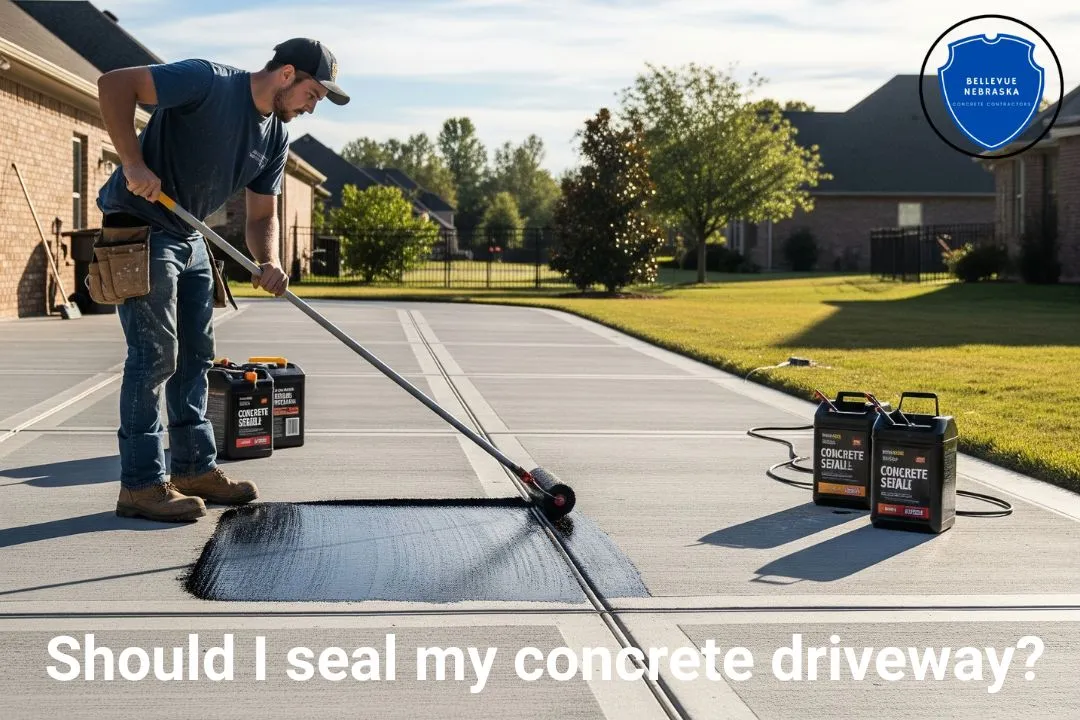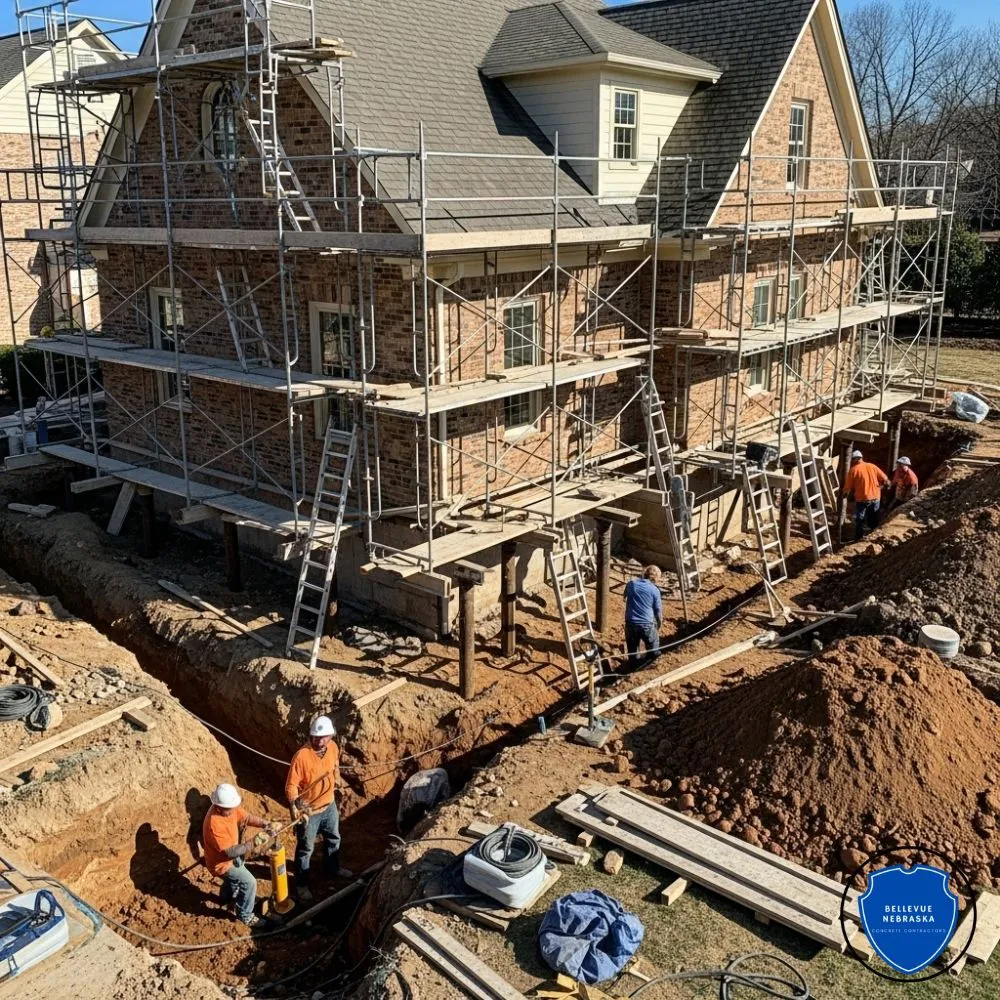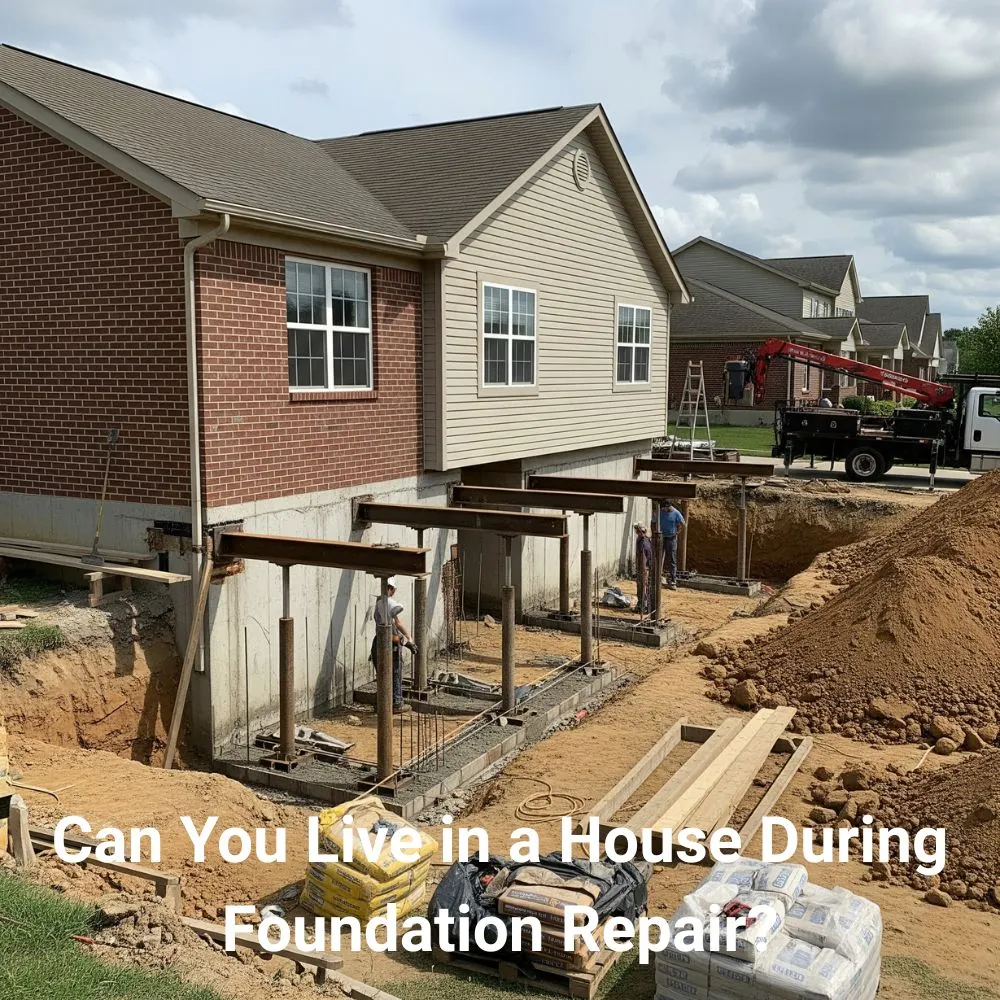Is sealing your concrete driveway necessary? It’s a common question homeowners ask, and for good reason. Driveways take a lot of daily wear from weather, cars, and spills. While concrete is tough, it’s not invincible. Sealing helps protect it and can extend its lifespan.
In most cases, sealing your concrete driveway is a smart move. It acts as a barrier against moisture, stains, cracks, and surface damage. If you want to avoid costly repairs down the road, sealing is worth considering.
This blog explains what sealing entails, the problems it helps prevent, and whether it is a suitable solution for your situation.
Should Your Concrete Driveway Be Sealed?
Sealing your concrete driveway is not just about looks. It provides real protection. A good concrete sealer creates a shield on the surface, helping block water, oil, and other stains. In colder climates, sealing is especially important because it reduces freeze-thaw damage. This type of damage can crack and chip the concrete over time.
If your driveway gets lots of traffic or sits under trees that drop sap and leaves, sealing keeps it cleaner and easier to maintain. It also helps preserve color and texture, especially if the concrete is stamped or stained.
Before sealing, consider your driveway’s current condition. If there are cracks or major stains, those should be addressed first. Also, think about your local climate and budget. Sealing is not expensive, but it does need to be repeated every few years. If you want your driveway to last longer and look better with less effort, sealing is a practical and cost-effective choice.
Common Problems With Unsealed Concrete Driveways
Leaving your concrete driveway unsealed may seem fine at first, but over time, problems can build up. Without a protective layer, your driveway becomes more vulnerable to damage that can lead to costly repairs or complete replacement. Here are the common issues:
- Water seeps in and causes cracks during cold weather.
- Oil stains soak in and become difficult to remove.
- Surface color fades from constant sun and weather exposure.
- Freeze-thaw cycles cause chipping, cracking, and surface breakdown.
- De-icing salts speed up concrete deterioration in winter conditions.
- Dirt and grime build up faster without a sealed surface.
- Tree sap and leaves leave lasting stains and marks.
- Mold and mildew grow more easily on porous concrete.
- Heavy vehicles wear down the surface faster over time.
- Rain erodes the top layer, making it rough and uneven.
Benefits of Sealing A Concrete Driveway
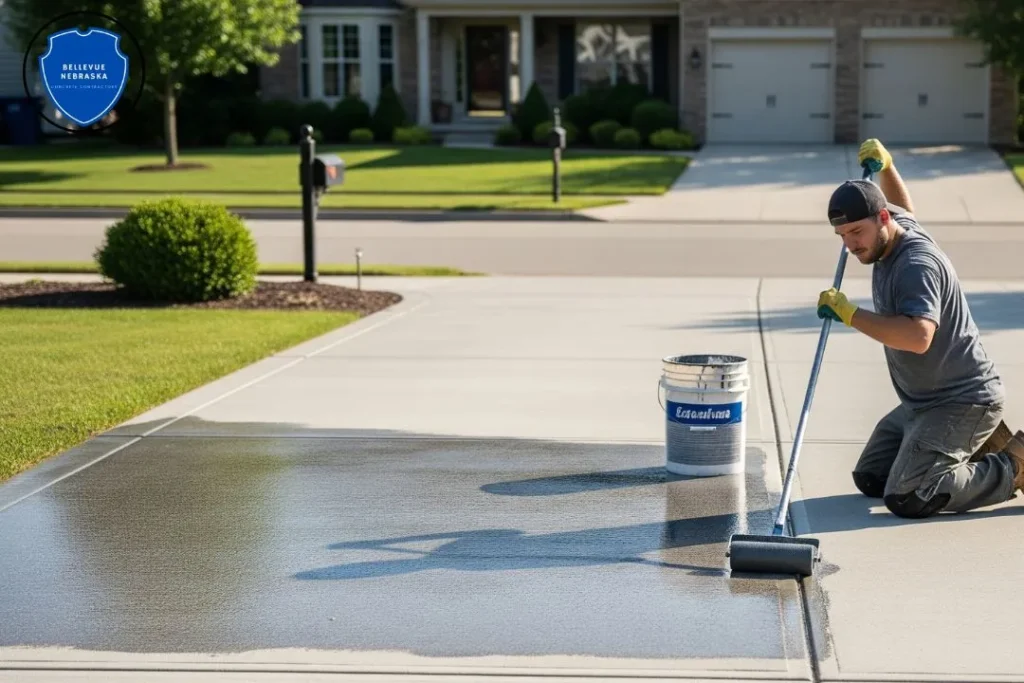
Sealing your concrete driveway offers more than just protection. It improves appearance, boosts durability, and makes cleaning easier. Below are the main benefits that make sealing a smart investment:
Improved Durability
A sealed driveway holds up better under daily wear from vehicles and weather. It prevents cracks from forming by blocking out water and protecting the surface from freeze-thaw cycles. Over time, this added strength means fewer repairs and longer-lasting concrete. If your driveway sees regular traffic or harsh conditions, sealing helps keep it in good shape for years.
Stain Resistance
Concrete is porous and can soak up oil, grease, and other spills. Sealing creates a smooth, water-resistant layer that makes it harder for stains to set in. This is especially helpful if your driveway is near trees, cars, or workspaces. A sealed surface also makes cleanup easier with less scrubbing and fewer deep stains.
Better Appearance
Sealing gives your driveway a clean, finished look. It can enhance the color of stamped or stained concrete and reduce fading from sun exposure. Even plain gray driveways appear fresher and more uniform after sealing. If curb appeal matters to you, a sealed driveway instantly looks more maintained and polished.
Longer Life Span
By blocking moisture and resisting damage, sealing extends your driveway’s lifespan. It slows down surface erosion, reduces cracking, and limits freeze-thaw impact. This means your concrete stays solid and safe for many more years. Investing in sealing now can help you avoid major repair costs down the line.
How Often Should You Reseal a Concrete Driveway?
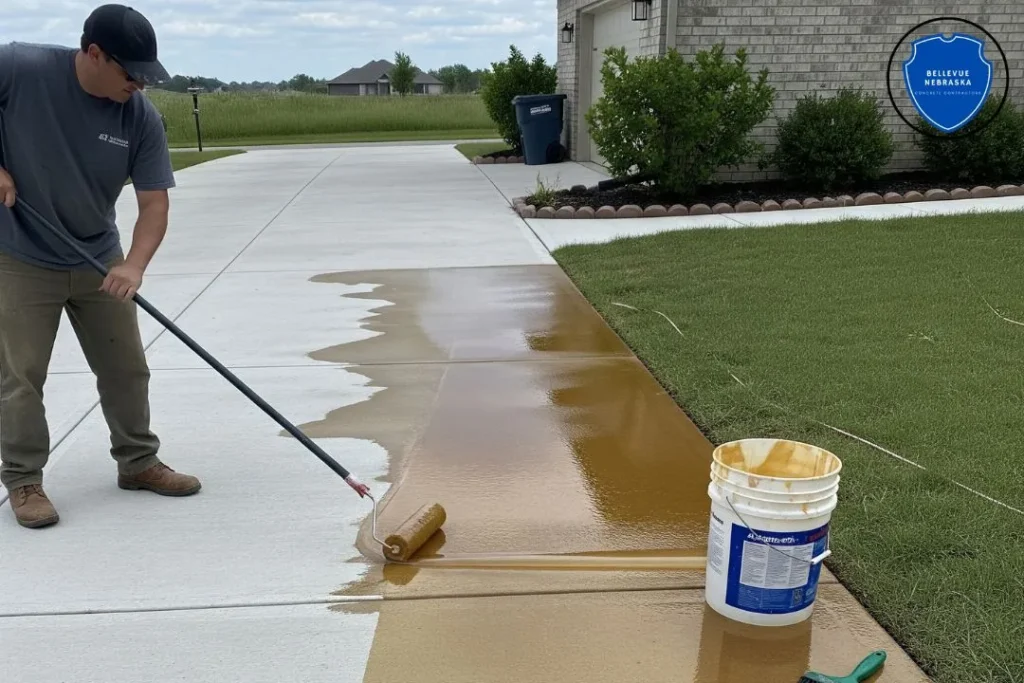
In general, you should reseal your concrete driveway every two to three years. However, the exact timing depends on your climate, how much traffic the driveway gets, and the type of sealer used. Some high-quality sealers last longer, while others wear out faster under harsh conditions.
A few clear signs tell you it’s time to reseal. If water stops beading on the surface, the sealer has worn off. Fading color, visible stains, or small cracks can also mean it’s time for a new coat.
Regular cleaning helps your sealer last longer, but even with good care, resealing is a must. It keeps the surface protected, helps prevent damage, and saves you from costly repairs later on. If you wait too long, the concrete may need patching or resurfacing before resealing can even begin. Keeping up with a resealing schedule is a simple way to protect your driveway and extend its life.
Is DIY Sealing a Good Idea or Should You Hire a Pro?
Sealing a driveway yourself can save money, but it takes time, effort, and attention to detail. Hiring a pro costs more but delivers consistent, long-lasting results with less hassle.
| Factor | DIY Sealing | Hiring a Pro |
| Cost | $50–$150 for materials | $300–$600 total, depending on size |
| Skill Needed | Moderate, follow directions closely | No, a professional handles everything |
| Time Required | Several hours to a full day | Usually completed within a day |
| Quality | Varies, depends on prep and technique | Consistent and professionally applied |
| Convenience | More work and cleanup are involved | No effort required from the homeowner |
| Longevity | 1–2 years, may wear unevenly | 2–3 years with even coverage |
When Is the Best Time of Year to Seal a Driveway?
The best time to seal your concrete driveway is during mild, dry weather. Ideally, choose a period when temperatures stay between 50°F and 85°F (10°C to 29°C). Sealing in hot, direct sunlight or extreme cold can cause the sealer to dry too fast or not cure properly.
Make sure there is no rain forecasted for at least 24 to 48 hours after sealing. Moisture can prevent the sealer from bonding well to the concrete, reducing its effectiveness. Early fall and late spring often offer the best conditions for sealing in many regions.
If you’re unsure about timing or want expert help, concrete contractors in Bellevue can advise you on the ideal window and proper preparation. Also, avoid sealing if your driveway is wet. It should be completely dry before starting. Proper weather and surface conditions help the sealer last longer and protect your driveway effectively.
Final Thoughts
Sealing your concrete driveway is a simple step that protects your investment and keeps it looking good for years. Regular maintenance, such as cleaning and timely resealing, helps prevent damage from stains, cracks, and weather.
Pay attention to signs that your driveway needs resealing, and act before problems get worse. Whether you choose to seal it yourself or hire a professional, the key is to maintain the protective layer consistently.
A well-sealed driveway not only improves curb appeal but also saves you money by reducing costly repairs. Treat your driveway with care, and it will serve your home well for a long time.
Frequently Asked Questions
Can sealing change the color of my concrete driveway?
Yes, some sealers add a slight glossy or wet look that can enhance the color, but they do not drastically change the concrete’s shade.
How long does it take for a sealer to dry completely?
Sealers typically dry to the touch within a few hours but may take 24 to 48 hours to fully cure and reach maximum strength.
Can I seal my driveway if it has existing cracks?
It’s best to repair cracks before sealing. Sealing over cracks won’t fix them and may worsen damage over time.
Does sealing reduce dust or debris on the driveway?
Sealed surfaces repel dust and dirt better, making your driveway easier to clean and maintain.

